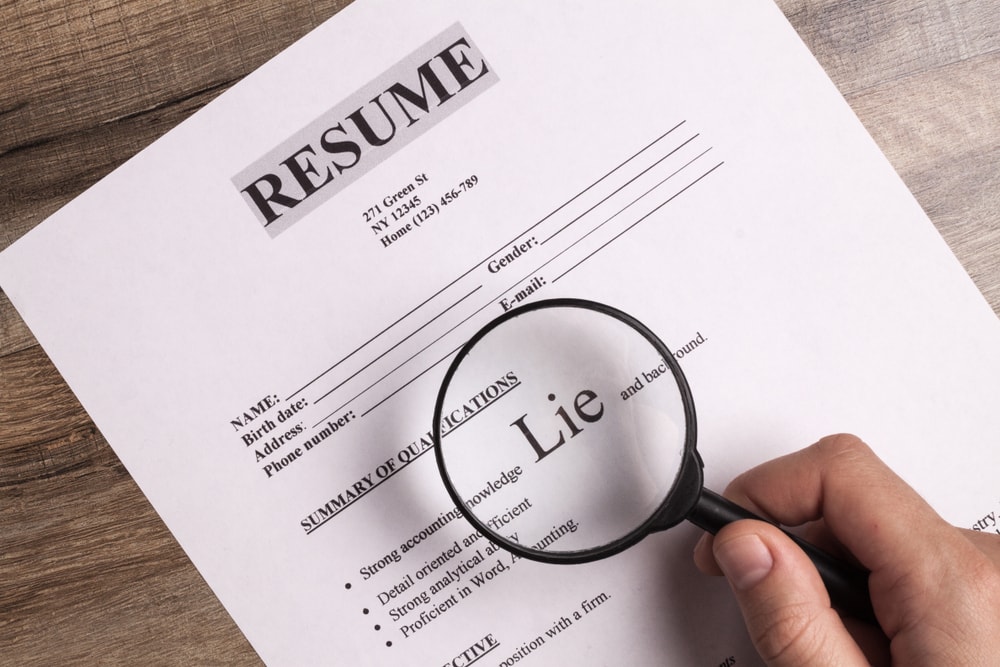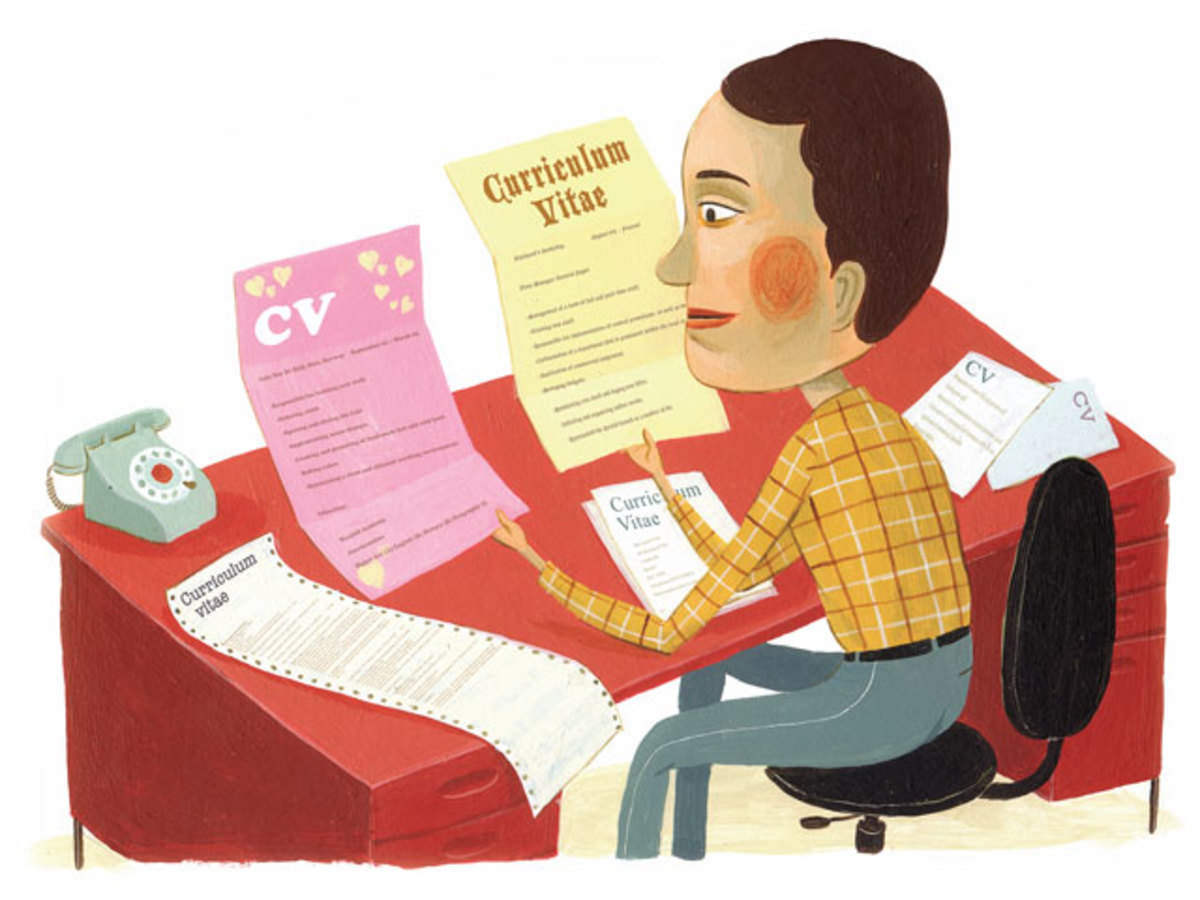Edit your CV? The biggest resume lies to avoid
Published

Finding a job is difficult enough, but when your competition cheats by lying on your resume, it can become even more difficult to stand out from the crowd. But lying on your resume will get you nowhere - except maybe in hot water.
According to the Monster survey "Future of Work: 2021 Outlook" 66% of employers believe applicants exaggerate their skills and competencies on their resumes. And in another survey Among 400 applicants and 400 HR managers, HR professionals and recruiters, Checkster found that a whopping 78% of applicants exaggerate the truth about themselves:
- 60% reported mastering skills that they only had basic knowledge of
- >50% reported working longer hours in some jobs to avoid an employer
- 45% gave an incorrect reason for leaving a job
- 42.25% invented relevant experiences
- 41.25% reported a director title when the actual title was manager
- 39.25% reported having a degree from a prestigious university rather than their own.
Newsflash: Companies will review your credentials, and yet the lies on your resume will likely continue. And why? Fear is the main reason. Fear of not being good enough, fear of not being able to keep up with the other applicants, fear of not being invited to an interview. Some people will do anything to gain an advantage.
It's very likely that lying on your resume will prevent you from taking advantage of this advantage. No matter what the job is, if the interviewer feels or has evidence that they can't trust you, that's it.
Whether you tell a little white lie or a blatant fabrication, getting caught can sabotage your career - especially because today's technology and social media environment makes it easier to get caught. And you will very, very likely get caught.
The 3 most common lies on job seekers’ resumes

Those : learning.shine.com
1. Glossing over training
People try to get more out of one or two courses they've taken than they should. For example, someone can list ETH Zurich on their CV even though they may have only taken one course online. The candidate in this case did not graduate from ETH Zurich or even visit it in person.
Better: Instead of glossing over your academic credentials, think about what you can add to your resume to demonstrate your education. Other professional development, honors or awards, and additional courses may be relevant.
2. Date deception
Another common deception is to cover up employment gaps by stretching the dates for one or two jobs to bridge a time gap or fabricating an interim job.
Better Tip: Sometimes it's a good strategy to allay an employer's concerns about gaps in your resume in advance. If you took time off to start a family, care for a loved one, go back to school, or take on an independent project, explain your circumstances in your cover letter and emphasize how committed you are to a position that you can grow from.
3. Expansion of skills
Many job candidates offer a long list of technical skills, but just because you've used a program a few times doesn't make you an expert. The same goes if you claim to be fluent in a language just because you studied it for a year in high school.
Better: Only list skills that you can actually demonstrate on site.
How to Get Caught Lying on Your Resume

Those : resumecoach.com
If you think you can outwit potential employers, think again. It's probably true that many job seekers can get away with a slight exaggeration here and an omission there, but ultimately misrepresentations can backfire on you.
Hiring managers have their feelers out when reviewing resumes, relying on background checks, reference checks, online research, social media exploration and in-person interviews to get to the truth.
Here are some ways lying on your resume will get you exposed as a fraud:
Skill assessments
Especially if you're applying for a skilled position that involves writing, programming, or designing, you should expect an employer to test you before hiring you. Assessments can confirm that you have the necessary experience, as can asking appropriate behavioral questions during the interview.
Research social media
If you have a social media profile and a website, you should ensure that the dates and basic facts match the resume you are submitting. Companies often even have an applicant's previous CVs on file that are completely different.
And of course there is Google. So if a version of your resume or work history is online, you should make sure it matches what you present to a potential employer.
Background checks
It is very easy for a hiring manager to contact your previous employers and educational institutions to check what is on your resume. And even if employers overlook false or misleading information before hiring a candidate, the job seeker is never truly off the hook. The resume liar is always at risk of being caught, and this can happen for many years after being hired. Say your company merges and you have to go through a vetting process again - these lies can end up haunting you.
Tips to avoid lying on your resume

Those : economictimes.indiatimes.com
Be honest. It sounds like a cliche, but honesty really is the best strategy. Instead of evading or completely distorting the facts, try the following strategies:
Rethink your design. A common way to format data on a resume is to align it right or left so that it stands out from the text. However, single dates surrounded by lots of white space attract attention - not a good choice for someone who wants to downplay frequent job changes.
Instead, place the information next to the job title or employer name so it blends in with the rest of the content.
Preempt a potential problem. You may be tempted to keep quiet about a job where your exit didn't go well, but omissions are like lies and can be just as damaging. Sometimes bad things happen. If you are honest and sincere, you can overcome this.
The truth in the matter
The fact is, no candidate is perfect, and if your resume suggests perfection, that in itself could make an employer sit up and take notice. Additionally, employers don’t expect perfection. What they expect is that your resume represents the real you. Most of us have had experiences that don't look good on our resumes.








